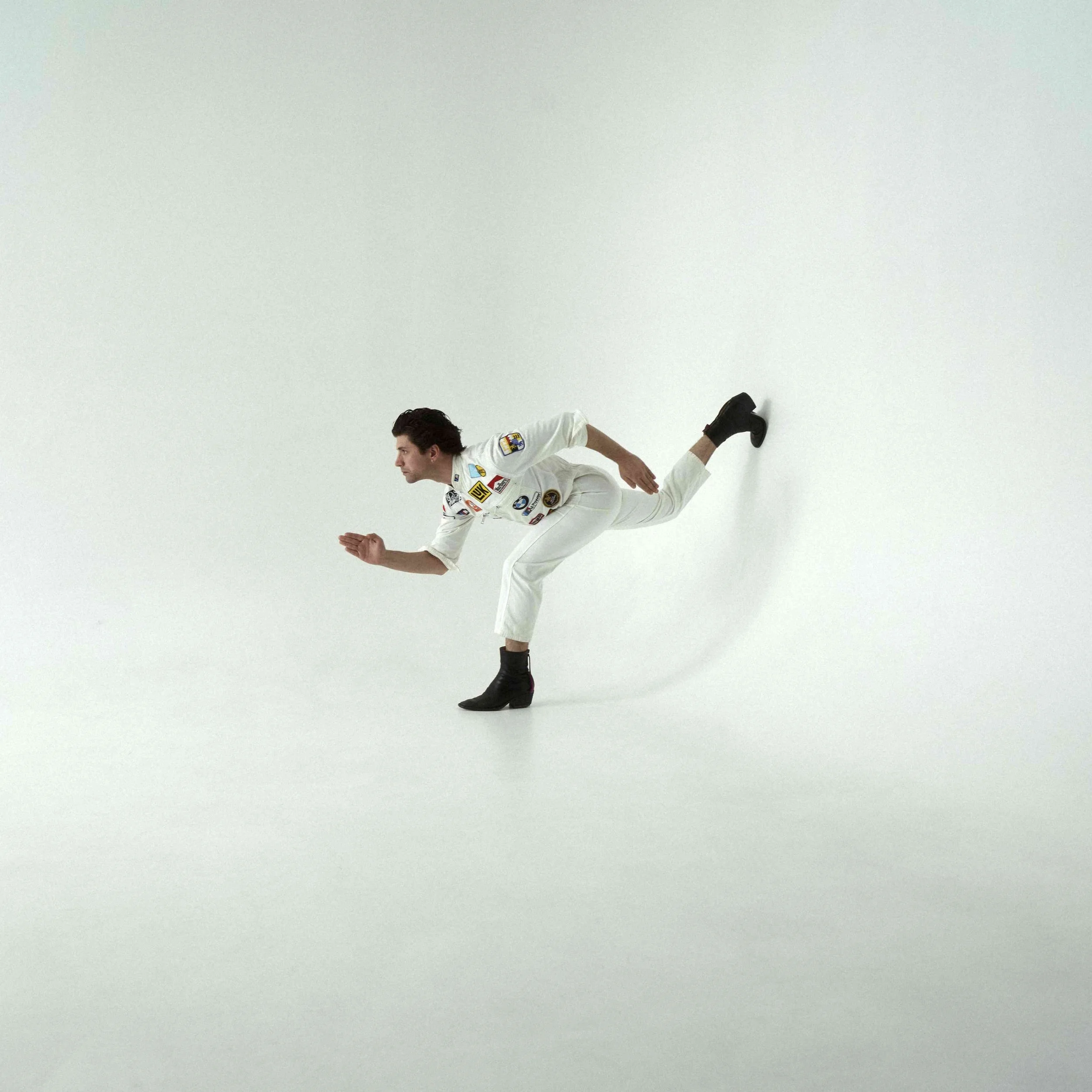Nocui
Nocui’s new single ‘Machine Power’ is just released anticipating the album, ‘Italian Robot,’ is an evocative exploration of technology, society, and human existence, wrapped in retro-futuristic and techno influences. Inspired by his background in Neuroscience and questions about humanity's relationship with technology, Nocui crafts a compelling narrative through electronic music. The album’s three-part story examines the transformation from human to machine, the machine's quest to reclaim humanity, and the ultimate acceptance of human vulnerabilities. 'Italian Robot' combines nostalgic yet futuristic soundscapes, encouraging listeners to reflect on the implications of technological advancements while delivering an impactful and thought-provoking auditory experience.
You’ve just announced your debut album ‘Italian Robot’ with a new single ‘Machine Power’- can you share what inspired the thematic journey, exploring technology, society, and human existence?
First of all, thank you for having me and giving me the opportunity to share the ideas behind this album!
The concept of this record is the result of a long and gradual evolution, with some themes tracing back to my time studying Neuroscience in college. Over the years, I’ve often thought about our contemporary human experience and ever-changing techno-social lives. These questions constantly came to mind:
● Is technology causing us to evade what defines our humanity? Is it encouraging passivity and creating an "efficient state of mediocrity"?
● Are we creating "super technologies" to replace fading belief systems? Do we miss the idea of God and the comfort it brings? Is belief inherent to our nature?
● Do we fear life so much that artificial existence seems preferable? Are production, profit, comfort, and emotional numbness worth a human-less future?
From these questions and their multiple angles of thought, “Italian Robot” gradually developed into a three-part story:
1. The human becoming a machine and sacrificing its humanity.
2. The machine glitching, recognizing something’s missing, and inventing back the human.
3. The acceptance of human nature and its beautiful vulnerabilities.
As humans, we are becoming increasingly aware of the problems arising from technological innovation and its interaction with our social lives. Technology is acting as a catalyst for us to evade what truly defines our humanity, feeding off our most negative and primitive instincts.
Fear drives our increasing reliance on technology—fear of learning, social environments, fatigue, failure, responsibility, and pain. We are gradually neglecting our human nature and preferring artificial life.
The objective of this record is to spark awareness about what’s at stake. Are we proceeding too quickly? Are we truly aware of what we are losing as we go deeper down the rabbit hole?
How do your retro-futuristic and techno influences shape the narrative of 'Italian Robot’?
They’re fundamental because they make the record intelligible rather than unnecessarily abstract. The concept behind it is already "not user-friendly," so using a sonic aesthetic that is somewhat nostalgic and symbolic makes the whole thing easier to digest.
I could have opted for a more unfamiliar sound, but that would have sacrificed the clearly artificial character of the instruments I chose to use for this record. It’s crucial to play with the idea of an artificial future because that’s where we are heading. Many electronic musical tools today excel at mimicking natural sounds, creating a perfect illusion, and for this very reason, I avoided using them. I wanted to highlight the grotesque aesthetics of the future we might be heading toward. By intentionally emphasizing the artificiality, I aim to provoke thought and reflection on the direction of our technological advancements and how they are crafting a “life that mimics life.”
For example, in 80s music, you can clearly hear this effect. Everything created with the drum machines and synths of that era needed to be big, impactful, and larger than life. It’s evident that something is off in these records; the sound is no longer natural, even though it attempts to be. This deliberate choice to embrace and emphasize the artificiality in 'Italian Robot' serves to underscore the unsettling and thought-provoking nature of the future we are approaching.
The retro-futuristic and techno influences are crucial because they ground the abstract themes in familiar yet futuristic soundscapes. These influences allow the listener to connect with the music on an emotional level while still being challenged by its thematic content. By using sounds that evoke both nostalgia and a sense of artificiality, I create a bridge between the past and the future, making the concept of an artificial future more relatable and impactful.
Could you describe your approach to producing 'Machine Power' and the album as a whole? How do you translate conceptual ideas into musical compositions?
The record incorporates a significant amount of electronic music history. The palette of synth colors and drum machines chosen throughout the record is key to creating this retro-futuristic sound, blending past influences with futuristic concepts to craft a unique auditory experience.
In “Machine Power,” as with other tracks on the record, the concept develops into music based on the specific theme I want to explore. This process typically begins with key words and derivative concepts that stem from the main theme. For example, in “Machine Power,” I aimed to depict the relentless power of an artificial being—grotesque, big, overwhelming, and imposing in nature. Once these ideas were laid out, I translated them into sound design choices, selecting specific synths and drum machines to embody these characteristics. These choices then inspired the composition, arrangement, and drum programming, ensuring that the final track captured the essence of the concept.
This thematic development is crucial because it allows each track to maintain its own identity while contributing to the overall narrative of the album. The music isn't just a backdrop; it's an integral part of the storytelling, reflecting the journey from artificial dominance to a more natural, human acceptance.
On the other hand, other tracks on the record, especially those toward the end, are more intuitive and impulsive in nature—one could even say more human. This shift is intentional and reflects the album's storyline, which is a gradual evolution from artificial to natural human acceptance. These tracks were created with a more spontaneous and organic process, allowing for a rawer and more emotional expression and the gradual appearance of my human voice in the tracks. This contrast highlights the journey and transformation that the album aims to portray.
For instance, the latter tracks may feature live instrumentation and less rigid programming to emphasize a return to more human elements. This progression from highly artificial and structured sounds to more natural and free-form compositions mirrors the overarching theme of the album.
Each track is a chapter in this narrative, contributing to a larger conversation about our relationship with technology and what it means for our future. The careful selection of sounds, the deliberate contrast between tracks, and the thoughtful composition all serve to create a powerful and thought-provoking experience for the listener.
As founder of Shapeless Culture, how does your role influence your creative work and the label's direction?
As the founder of Shapeless Culture, my role deeply influences both my creative work and the direction of the label. Operating my own label affords me the freedom to create music without the constraints or pressures imposed by external influences or rigid professional norms. This autonomy is crucial as it allows me to explore and express my artistic vision authentically, leading to music that is more genuine and impactful. Art, in my view, thrives when it is liberated from external expectations and can challenge established norms.
In terms of the label’s direction, I adopt a supportive rather than directive role with our artists. My priority is to empower them with trust and the necessary tools to elevate their music to the highest technical standards. While I offer guidance, tools, and feedback based on my experience, I am mindful not to impose my artistic preferences onto their work. Having personally experienced the effects of artistic constraints under other labels in the past, I am committed to fostering an environment at Shapeless Culture where artists feel empowered to explore and innovate without the pressure of conforming to commercial standards. If a particular artist’s sound doesn’t resonate with me personally, I simply choose not to collaborate, rather than attempting to mold their work to fit a predefined label aesthetic. This approach ensures that the music released on Shapeless Culture remains diverse, authentic, and artistically compelling, reflecting the unique voices and visions of our artists.
What can fans anticipate from 'Italian Robot' and Shapeless Culture in 2024? Are there new collaborations or directions in your music you're excited about?
I hope “Italian Robot” will resonate as an island of clarity for its listeners, bringing a sense of connection and understanding amidst the complexities of modern life. This record delivers vibrant energy and a powerful message that encourages reflection on the themes it explores.
And musically speaking, the whole record is fire! I’m biased, of course.
At Shapeless Culture, we’re buzzing with excitement about the music we’ve been crafting and the new collaborations on the horizon! We’ve been pouring our hearts into creating diverse and innovative sounds that push the boundaries of electronic music. There’s a lot of creativity flowing, and we can’t wait to share it all with you. Stay tuned for some thrilling releases!
interview DONALD GJOKA
What to read next












